- Home
- Alex Scarrow
Plague World Page 6
Plague World Read online
Page 6
‘Stewart. Iain. Good boys, both of them.’ The line went dead for a moment. Then: ‘What about you?’
‘Mine?’ Tom wasn’t inclined to air his personal grief in public like this. But for a man prepared to go down with dignity, displaying that British stiff upper lip that Tom had always assumed was nothing more than a movie cliché . . . he was happy to indulge him.
‘They were called Leon. And Grace.’
‘Then you pray for your kids as well.’
‘I do. Every day.’
The line hummed and crackled for a while. ‘I’m going to go now. Things to attend to here.’
‘Understood.’ He wondered how the hell to sign off from this conversation. Nothing he could think of to tack on the end felt worthwhile or seemed right. He pressed the Talk button.
‘You go and join your boys, Reynolds.’
There was no answer this time.
Five minutes later, the Sea Queen rolled over; a few minutes after that, all that was left to mark she’d ever been there was a loose archipelago of floating debris.
CHAPTER 11
Leon stopped pushing the rattling cage, and for a couple of minutes he and Cora allowed themselves to collapse to the ground inside and catch their breath. There were still about a dozen or so crabs clinging on to the mesh, scrabbling and fidgeting to find a way in. He flicked at the spindly leg of one that was poking through. The leg snapped easily and leaked out a thread of goo that dangled and swung like a pendulum of snot.
‘Do you think these are the stubborn ones?’ he asked between gulps of air. ‘Or the stupid ones?’
Cora wheezed out a laugh.
The rest of the swarm had fallen away from their cage as it moved forward. A few of them had a second go at nosing their way in at the bottom, before giving up and dropping off.
With the scuttlers gone, they’d been able to see where they were going.
‘Where are the others?’ gasped Cora. ‘Where did the crabs go?’
‘I dunno,’ huffed Leon. He looked around frantically. No sign of them. He felt a sickening tug at his gut. ‘Maybe something else attracted them?’
Cora met his gaze. ‘Oh, God help them.’
He looked around. They’d come to an exhausted rest in the middle of an acre of open concrete. The labyrinth of warehouses and industrial units was behind them. Ahead, he could see the flat blue-grey water of the Solent and the quayside that days ago had been lined with navy ships and the remains of the refugee camp.
The tall wire mesh reinforced by iron stanchions that had ringed the vast containment pen had been stampeded flat in several places, though most of it remained intact. The less well reinforced perimeter barrier around the camp was in tatters: loose coils of razor wire had been shunted aside or flattened by the weight of flesh-stripped corpses.
The camp itself looked as if a tsunami had hit it. The ground was strewn with cloth-tangled bundles of bone, crates of miscellaneous supplies dropped and spilled. The row of medics’ tents on the US side of the camp had burned to the ground, leaving nothing more than soot-covered support poles and hard, blackened puddles of melted vinyl. On the far side of the camp, the Pacific Nations side, the tents were still standing in two neat rows. The ground across the camp seemed to be free of the criss-crossing patterns of veins and tributaries. The virus appeared to have picked the bodies here clean, and moved on to pastures new.
Nothing to see here, folks, move along.
Leon scanned the site for any signs of movement, wondering how the hell such a horrific scene had come to feel so normal, so quickly. Save for a twisting spiral of smoke coming from a small stack of smouldering tyres and the occasional flap of a loose corner of tarpaulin caught by the offshore breeze, it was inert and eerily silent.
‘I can’t see the others anywhere,’ whispered Cora.
Leo’s slow pan halted on a couple of the cages upended beside the camp’s perimeter. For a moment his heart skipped as he imagined them toppling over and the virals flooding in to get them. But there were no bodies.
‘Hold on! There!’ puffed Cora. He followed her finger and saw four figures huddled together, right at the edge of the quay. She cupped her hands and was about to call to them, but Leon grabbed her arm.
‘Don’t!’ he cautioned. ‘Don’t shout!’
Cora nodded quickly.
Cautiously Leon began to lift up the cage.
‘What are you doing!’ she hissed.
Leon nodded at the debris-strewn ground ahead. ‘We’re not going to get any further in this.’
‘I’m scared!’
‘Me too, but . . . we can’t just sit here. We’ve got to find a truck or something. While we can!’
‘Shit, Leon . . . I’m so . . .’
‘I know. I know, but we’ve got to keep moving.’
Cautiously Leon resumed lifting the back of their cage up, and they both climbed out from beneath it. He offered Cora his hand as she struggled to get to her feet.
‘My God,’ she gasped, squeezing the backs of her legs. ‘My legs feel like rubber.’
Leon could feel the same dull ache. Doubled over and wheeling that heavy cage all the way down to the quayside, they’d been effectively doing one long squat thrust for the last hour.
Now that the surge of adrenalin that had kept him going was beginning to ebb away, he suddenly realized how utterly spent he was. His arms and legs were wobbling with fatigue and lack of food, he felt light-headed and nauseous – ready to collapse.
He leaned against the cage as he tried to make out who he was seeing in the distance. He recognized Finley’s small frame. Two of the other three had to be Kim and Howard. The other one, large and heavy, was unmistakably Adewale.
‘Where’s Jake?’ asked Cora.
‘And the other two?’ added Leon. He couldn’t see another abandoned cage anywhere. He turned to look back where they’d come from, hoping to see Dawn and Artur bringing up the rear, but there was no sign of them.
‘But . . . they were ahead of us!’ hissed Cora.
At the beginning, they were.
Shit.
‘There’s someone!’ said Cora.
He turned back and looked in the direction she was pointing, and saw a lone figure pacing backwards and forwards between several trucks, a gun slung over one shoulder. It looked like Jake. He pulled himself up into the driver’s side of one of the trucks, then a moment later heard the growl and snarl of an engine starting up. The vehicle began to turn sluggishly and made its way across the abandoned camp towards the others.
‘Come on,’ said Leon. He offered Cora his arm and they slowly picked their way across the ruins and debris of the camp, Leon scanning the clumps of clothing, desperately hoping not to catch a glimpse of Freya’s orange anorak.
Kim waved them over. A moment later they joined the group standing beside the idling truck. The engine growled, then died.
‘I heard a cage go over back there,’ said Adewale. ‘And I heard screams. I thought it was you two. It was behind us. It must have been the others.’
‘Shit,’ muttered Kim.
‘We nearly went over,’ was all Leon managed to say. He thought he should have felt something. Two people he’d been beginning to know may well have just died. He felt nothing. Just relief that it hadn’t been him and Cora.
‘Poor Dawn and Artur,’ whispered Kim.
‘We need to get going,’ said Leon. ‘Before those things sniff us out again.’
Jake emerged from the driver’s side and hopped down.
‘This truck’s loaded with stuff. Food, water, guns and a couple of saltwater sprayers.’
‘Good job, Jake. Let’s get on and get the crap out of here.’
‘What about Dawn and Artur?’ Harper was scanning the warehouses. ‘What if they’re trapped in one of those? We can’t just . . . ?’
Leon felt everyone eyes resting on him.
Jake said what no one else wanted to say. ‘We can. We have to. Right, Leon?’
; Leon shook his head. It felt like a betrayal abandoning them, not even hanging on a while longer to see if they were going to emerge. His heart said wait.
But something else came out. ‘We’d better go. While we can.’
‘No!’ cut in Cora. ‘He’s right! We can’t just leave them!’
‘They’re dead!’ said Adewale. ‘I heard the screams. They went over. They’re dead!’
Leon looked at Jake, hoping he was ready to assume the leading role. Instead he shook his head back at him subtly.
Your call, mate.
‘We’re going,’ Leon said softly. Cleared his throat, then again. ‘We’re going. Now.’
CHAPTER 12
Grace stared at the small, round window; its diameter was just twenty centimetres, and the glass so thick it was like looking down the neck of a bottle. On the other side she could see his familiar face.
Jing – that was the only name he’d given her.
‘How are you this morning, Grace?’ His voice came over the intercom speaker.
‘I’m OK,’ she replied.
Over the last few days she’d glimpsed a number of faces through this small spyhole window, heard a number of different voices, but Jing was the one presence that was always there. She’d spoken briefly with the carrier’s Chinese commander, an Australian Navy officer, and a physician from New Zealand, and with all of them the conversation had ended up following roughly the same pattern:
‘You’re infected by the virus?’
‘No, I’m not infected by the virus, I am the virus. I represent the virus.’
‘Can you explain what you mean by that, Grace?’
‘I am a human construct.’
‘A copy of a human?’
‘If you like.’
‘So if “Grace” is not your proper name, how do you want us to address you?’
‘Grace is my name. You can call me Grace. I’d prefer it.’
‘You’re a virus . . . called “Grace”?’
‘No. I am a collective. A community made up of what we call “partials”. Many of these partials were parts of other humans, but the most-present human in this construct is me. So you probably should call me “Grace”.’
The first time she’d had this conversation she’d been asked to clarify the difference between being a ‘collective’ and someone who was simply infected. She’d responded by allowing the softest tissue on her face – the white of her left eye – to extrude a slender and pale tendril that swayed like a sea anemone until it finally found purchase on the small, round window and began to splay filaments of growth across the glass.
‘Please stop that,’ the physician had said. No one had asked her to clarify the distinction again.
‘Why are you here, Grace?’
‘Why did I risk being burned by your men?’
‘Yes.’
‘Because I want to talk with you.’
‘About what?’
‘They want to know more about you. I thought I could help.’
‘They . . . When you say “They”, who are you referring to?’
‘The virus, of course.’
‘You’re actually saying the virus communicates with you?’
‘Yes.’
‘How?’
‘By talking, I suppose. Just like we are now.’
‘Would it be possible for us to “talk” to it?’
‘You kind of already . . . are.’
‘Are you ready for your breakfast, Grace?’
She nodded. ‘Yes. Please.’
Faintly, through the thick lead-lined door, she heard a hatch on the far side slam shut, then heard something humming within the door itself, then the light on her side of the door turned green. She slid the hatch open and reached for the small tray in the cubbyhole beyond.
They gave her exactly what she’d asked for: a glucose solution. It was a bowl of sugar dissolved in warm water, a cloudy, viscous and sickeningly sweet soup.
Jing smiled at her through the lens-like window. ‘It would be easier for us if we just gave you a can of Coca-Cola.’
She took the bowl of sugar solution and set it down on the floor, careful not to spill a single drop. She smiled at Jing through the window.
‘I’ll be back in a little while.’
Maintaining her complete human form was now an unnecessary expenditure of effort and energy. She’d managed it for a number of weeks back in England, but now, exhausted by the effort, she could reduce to a more energy-efficient form.
She glanced at the corner of the small isolation chamber and looked at the camera mounted there on a bracket. She knew it was seeing everything and recording everything. There were no secrets now. All the same, a degree of discretion would be better at this stage. Part of what she was hoping to achieve was to demonstrate that she wasn’t a monster. She was still a girl called Grace; it was just that her physical form was malleable.
She placed the bowl on the floor in the corner furthest from the camera and lay down beside it, curling herself around it in a foetal position.
They could probably guess at what she was doing, but it wasn’t something they necessarily needed to see with their own eyes.
Her intention was not to frighten them.
She lifted her pink T-shirt and shuffled until the bowl’s lip was touching her bare belly, then lay still for a moment, closing her eyes and communicating with her community of colleagues that breakfast was ready.
The pale skin around her navel instantly began to soften to a milky gel, from which emerged half a dozen nodules of flesh. They each extended cautiously towards the bowl, little finger-thick tentacles, arcing and curling blindly, each one like the tender trunk of a tiny flesh-coloured elephant, ‘sniffing’ the air. They finally sensed the meal and dipped down towards the sugar solution, submerging into the thick liquid.
Grace could feel the replenishment of energy in her inner world almost immediately: a sugar rush a thousand times faster and more efficient than that experienced by any child chewing sweets. The millions of little workers in Grace’s feed tubes were already wholly replenished by the sugar and, having had their fill, were passing the goodness on, up the tubes and into her torso, where delivery cells were already gathering, feeding and inflating like gluttonous mosquitos ready to travel the arterial network and distribute the sugar banquet to those cells that couldn’t get away from their work.
If it wasn’t for the fact that she wanted to retain this human construction in order to present the best possible face to her captors, she’d have allowed her whole body to dissolve around the bowl into a resting pool, to give every cell a break. But instead, like soldiers on a diplomatic mission, she needed to keep a presence they could understand.
All the same, Grace allowed her conscious self to descend into her micro-universe to feast and to relax. The cold glare of the lights, the harsh white of the bulkheads, the steady chug of the aircraft carrier’s engines, the hiss of the intercom speaker – all these things receded as she descended into the warm darkness of her internal universe.
Her sense of vision became taste, her sense of hearing became a chemical language. Her mind did what it was used to doing – taking sensations and turning them into an illusion that was meaningful and pleasant.
She found herself in Grandma and Grandad’s country house in England, sitting at their large oak kitchen table. Grandma – the vision she had for her was based on fading childhood memories – brought her a plate of freshly baked biscuits.
‘Thank you, Grandma.’
‘You’re very welcome, my love.’
Grace watched the illusion of her settle down on to a wooden stool, and wished she and Leon had visited them more often before the plague came. She had only the sketchiest recollection of her face – kind eyes surrounded by laughter lines, fine curly hair as white as fresh snow and cherub-like cheeks that belonged on a much younger face.
‘You miss me and Grandad, don’t you?’
Sometimes she let her illusions ha
ve their own thoughts and voices. ‘Yes.’
‘We never made it into your new world, my love. I’m so sorry.’
Grace couldn’t know that for certain, but it was likely. They were old and remote. If they’d avoided being infected in the initial outbreak, they probably would have died shortly after from starvation or the cold.
Death was death. Not even They could do anything about that.
Grandma smiled kindly. ‘But at least you remember us, love.’
CHAPTER 13
‘So what’s your story?’ asked Leon.
Now they were on the move in a large truck along an empty road, for the first time in what seemed like a lifetime, he almost felt relaxed enough to try talking like people used to talk.
Jake was driving the truck, Leon sitting on the seat beside him and the other five were in the back. They were taking the A31 south-west out of the city, heading through the New Forest to Bournemouth, the next big port along the south coast. They’d come to the conclusion that following the coast until they reached the Cornish toe of England’s foot might possibly result in bumping into the recently departed fleet in the hope it might stop again before heading out to sea.
It was a long shot.
‘You mean, what was my life like before all the shit?’
Leon nodded.
‘Not up to much. I was doing a degree. Well, I’d just started one, anyway.’
‘Oh yeah? In what?’
‘Geology and geophysics.’
‘Uh, OK.’ Leon nodded. ‘Like rocks an’ shit.’
Jake turned slowly and raised a brow at him. ‘So-o-o much more than “rocks an’ shit”, matey.’
‘Sorry. I wasn’t being—’
‘Nah, it’s OK.’ He turned back to gaze at the empty road ahead. ‘My friends used to say the same thing. It’s not exactly a sex, drugs and rock-’n’-roll subject.’
‘So why study rocks?’ Leon shuffled on the hard seat to get comfortable. ‘Did someone give you a sparkly geode when you were a little kid, or something?’
‘My dad, actually.’ He swigged from the water bottle parked in the coffee-cup holder between them. ‘He was an oil logistics engineer.’
‘Right.’ The term didn’t mean a thing to him.

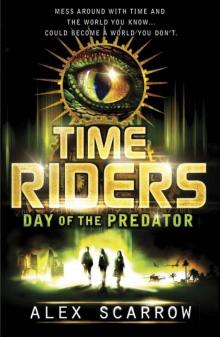 Day of the Predator
Day of the Predator Ellie Quin Book 3: Beneath the Neon Sky
Ellie Quin Book 3: Beneath the Neon Sky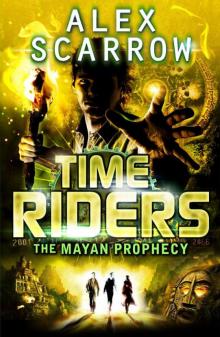 The Mayan Prophecy
The Mayan Prophecy October Skies
October Skies Ellie Quin Episode 4: Ellie Quin in WonderLand (The Ellie Quin Series)
Ellie Quin Episode 4: Ellie Quin in WonderLand (The Ellie Quin Series)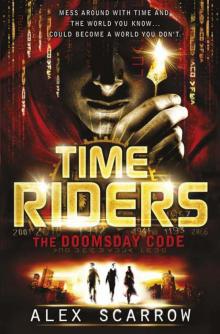 Time Riders
Time Riders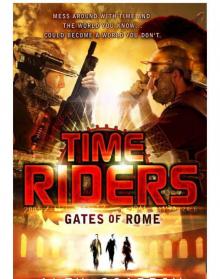 Gates of Rome
Gates of Rome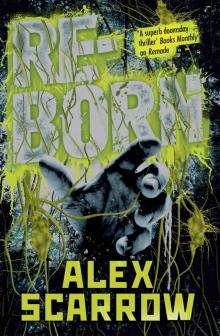 Reborn
Reborn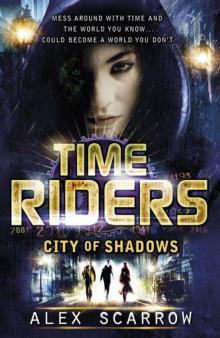 City of Shadows
City of Shadows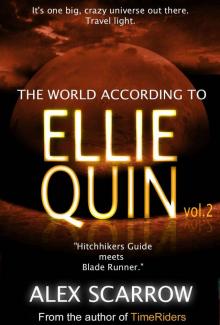 Ellie Quin Book 2: The World According to Ellie Quin (The Ellie Quin Series)
Ellie Quin Book 2: The World According to Ellie Quin (The Ellie Quin Series) Ellie Quin Episode 5: A Girl Reborn
Ellie Quin Episode 5: A Girl Reborn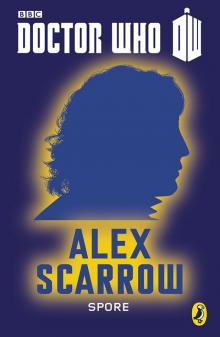 Spore
Spore The Eternal War
The Eternal War Last Light
Last Light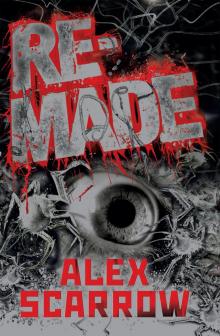 Remade
Remade Ellie Quin Book 2: The World According to Ellie Quin
Ellie Quin Book 2: The World According to Ellie Quin Ellie Quin Book 3: Beneath the Neon Sky (The Ellie Quin Series)
Ellie Quin Book 3: Beneath the Neon Sky (The Ellie Quin Series)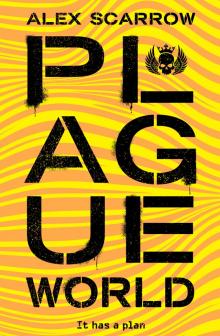 Plague World
Plague World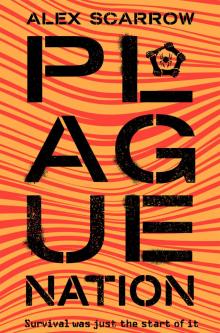 Plague Nation
Plague Nation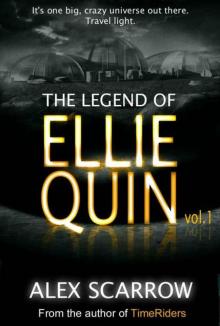 Ellie Quin Book 01: The Legend of Ellie Quin
Ellie Quin Book 01: The Legend of Ellie Quin Ellie Quin - 04 - Ellie Quin in WonderLand
Ellie Quin - 04 - Ellie Quin in WonderLand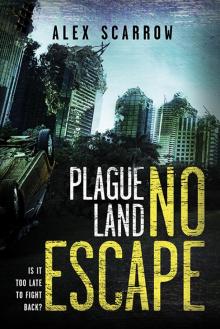 No Escape
No Escape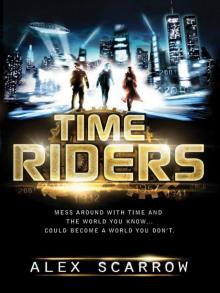 TimeRiders
TimeRiders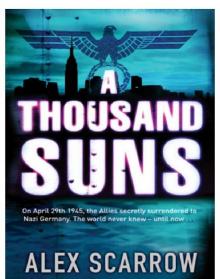 A Thousand Suns
A Thousand Suns The Candle Man
The Candle Man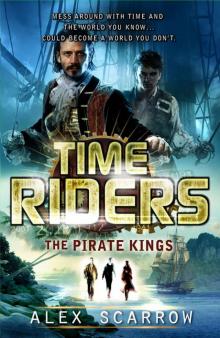 The Pirate Kings
The Pirate Kings Burning Truth: An Edge-0f-The-Seat British Crime Thriller (DCI BOYD CRIME THRILLERS Book3) (DCI BOYD CRIME SERIES)
Burning Truth: An Edge-0f-The-Seat British Crime Thriller (DCI BOYD CRIME THRILLERS Book3) (DCI BOYD CRIME SERIES)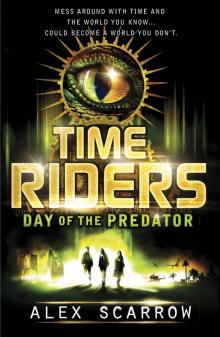 Day of the Predator tr-2
Day of the Predator tr-2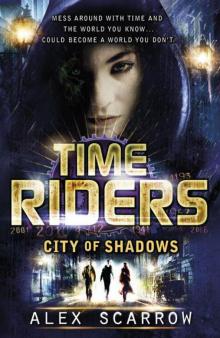 City of Shadows tr-6
City of Shadows tr-6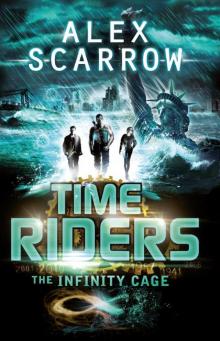 TimeRiders: The Infinity Cage (book 9)
TimeRiders: The Infinity Cage (book 9)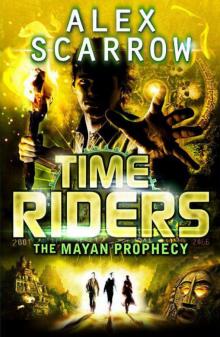 The mayan prophecy (Timeriders # 8)
The mayan prophecy (Timeriders # 8)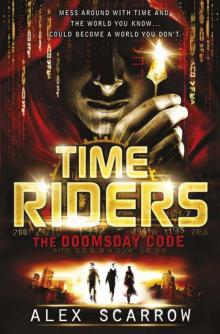 TimeRiders: The Doomsday Code (Book 3)
TimeRiders: The Doomsday Code (Book 3)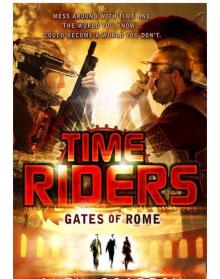 Gates of Rome tr-5
Gates of Rome tr-5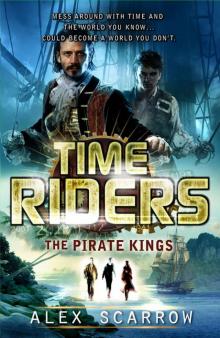 TimeRiders: The Pirate Kings (Book 7)
TimeRiders: The Pirate Kings (Book 7)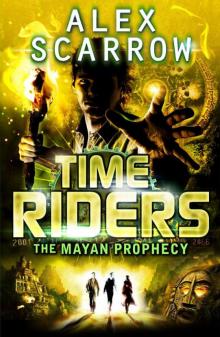 TimeRiders: The Mayan Prophecy (Book 8)
TimeRiders: The Mayan Prophecy (Book 8)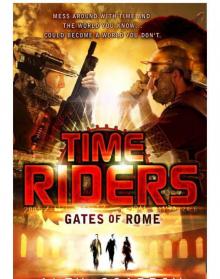 TimeRiders 05 - Gates of Rome
TimeRiders 05 - Gates of Rome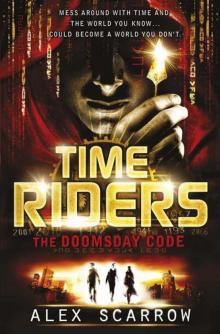 The Doomsday Code tr-3
The Doomsday Code tr-3 The Eternal War tr-4
The Eternal War tr-4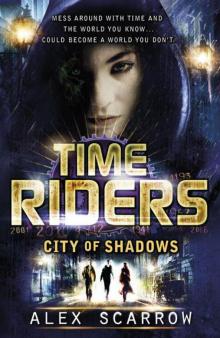 TimeRiders: City of Shadows (Book 6)
TimeRiders: City of Shadows (Book 6)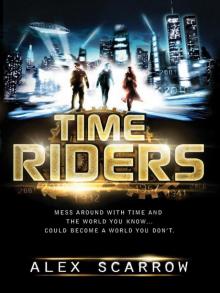 Time Riders tr-1
Time Riders tr-1 Afterlight
Afterlight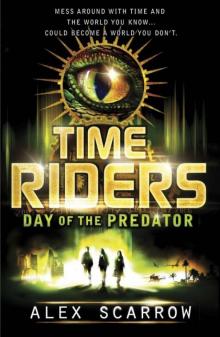 TimeRiders, Day of the Predator
TimeRiders, Day of the Predator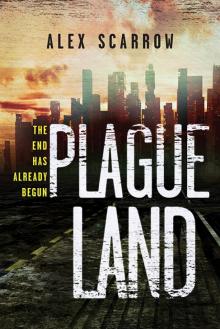 Plague Land Series, Book 1
Plague Land Series, Book 1